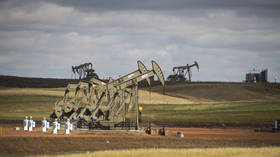Oil price war came at the worst possible time, and a truce between Moscow and Riyadh can’t come too soon
A dispute between Saudi Arabia and Russia on oil production levels would have been bad at any other time, but the Covid-19 pandemic made it so much worse. There will be time for blame later; the world needs an oil ‘ceasefire’ now.
In almost a month since Saudi Arabia and the United Arab Emirates ramped up production – ostensibly to punish Russia for refusing to accept additional cuts under OPEC+ quotas – the oil price has crashed by over 70 percent, with Brent crude at $32.5 and WTI at $24.5 a barrel as of Tuesday.
Just days later, the bump in production met the sudden collapse of demand, as almost half the world – from North America to Europe and the Indian subcontinent – found itself stuck at home due to the coronavirus pandemic.
“The global economy has been dying of accumulated debt for 50 years. Coronavirus has sent it to the intensive care unit,” Oilprice.com analyst Arthur Berman wrote on Monday in a gloomy retrospective.
The US ended up getting hit the hardest, by both the pandemic and the price war. Its shale oil prospectors have been behind the boom in production over the past decade, and the emergence of America as a major oil supplier since 2015. Their success depended on arbitrage between Brent and WTI, however. Now that it has gone negative, the heavily indebted shale sector is in ruins, rigs are shutting down and crude is selling for as low as $10 a barrel in places.
Energy analysts all seem to agree that a price war between Riyadh and Moscow was intended to harm Washington – they just differ on whose fault it was: MarketWatch pointed at Russia, while OilPrice.com blamed the Saudis, for instance.
All three countries actually need the price of oil to be much higher. US shale prospectors can break even at $40 a barrel, Russia would like it to be at least $45, and the Saudis actually need $80 for a balanced budget, according to multiple estimates. The current price war has pushed it down to $20 at times, and it might keep falling even with a deal.
Last week, Russian President Vladimir Putin blamed “efforts by our partners from Saudi Arabia to eliminate competitors who produce so-called shale oil,” meaning the Americans. “But we don’t need that, we never set such a goal,” he added.
The howls of protest that followed from Saudi officials – from Foreign Minister Prince Faisal bin Farhan to Energy Minister Prince Abdulaziz bin Salman – were the dead giveaway that Putin had struck a nerve.
Prince bin Salman, one of the king’s sons, “expressed his surprise at the attempts to bring Saudi Arabia into hostilities against the shale oil industry, which is completely false as our Russian friends recognize well,” according to AP. Sure, just as Captain Renault was shocked that there was gambling at Rick’s casino in Casablanca.
While Russia doesn’t owe the US any favors – not after years of demonization and sanctions by the US establishment, which continued under President Donald Trump thanks to the spurious ‘Russiagate’ scandal – Putin has repeatedly extended the hand of friendship to Washington. He even sent medical equipment to the US last week, to outraged shrieks from professional Russophobes across the think-tank-sphere.
Also on rt.com ‘This is NUTS!’ Russiagaters see red over Putin’s planeload of corona-aid for Trump, queue to look gift-horse in mouthOn the other hand, the peculiar partnership formed after WWII – in which Uncle Sam provides the military machine to keep the House of Saud in power, while Riyadh provides the fuel for it – has frayed in recent years. Though Trump has kept up an absolutely hostile line on the Saudis’ number-one enemy, Iran, and a firm friendship with the kingdom’s de-facto regent Prince Mohammed bin Salman, he has also boasted about the US achieving energy independence. Whether he intended this or not, it reminded the Saudis of the geopolitical clout they lost since the 1970s, when their oil embargo plunged the US into a deep recession.
Even as he praised individual leaders as friends and good people, Trump has been a ruthless American nationalist. He just won a three-year trade war with Beijing, arguing that China has “taken advantage” of the US for far too long. Now he is blaming China for the virus – and his rhetoric is a handy preview of the rage he might unleash on Riyadh if he were ever to decide his ally back-stabbed America using the pandemic as cover.
“Throughout this game, it has been imperative for the Saudis that the United States put the blame for the oil price war squarely on Russia,”OilPrice.com editorialized on Tuesday. Yet Trump reportedly told bin Salman “enough is enough” in a phone call last week. He has also said, repeatedly, he might impose tariffs on US oil imports – something that would hurt the Saudis far more than it would Russia.
All of this suggests that some kind of truce in the oil price war is forthcoming. Perhaps, with the constructive participation of all sides, it might even turn into some kind of long-term peace. Already reeling from the economic fallout of the coronavirus, the world sure could use it.
Think your friends would be interested? Share this story!
The statements, views and opinions expressed in this column are solely those of the author and do not necessarily represent those of RT.














